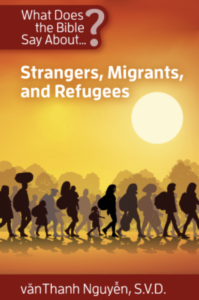
What Does the Bible Say About Strangers, Migrants and Refugees?

vănThanh Nguyễn, S.V.D., is a professor of New Testament Studies and the holder of the Francis X. Ford, M.M., Chair of Catholic Missiology at Catholic Theological Union in Chicago. He has authored several books and numerous articles, including “Acts” in The Jerome Biblical Commentary for the 21st Century. His latest book, What Does the Bible Say About Strangers, Migrants and Refugees? was published in 2021 by New City Press.
He is a panelist in the IACS event Neighbors at the Border: An ecumenical conversation about migration and immigration in Christian thought. Moderated by Religion News Service Reporter Alejandra Molina, the conversation features scholars Rev. Julia Lambert Fogg, Ph.D. and Rev. Erick Berrelleza, S.J.
IACS spoke to vănThanh Nguyễn about the Bible, immigration and his own experiences as a refugee.

Q: How have your own experiences as a refugee and priest shaped your view of immigration and migration?
vănThanh Nguyễn: The topic of migration has captured my attention for a long time. I have read a lot on this topic and even designed a graduate course on this global phenomenon. Furthermore, having been an immigrant and refugee myself, I know what it’s like to traverse borders and to survive. Seeking shelter and a means to stay afloat were part of everyday life. As a priest and especially as a biblical scholar I have been able to preach and teach about being in solidarity with these vulnerable migrants. Treating them with mercy and charity is what the Bible and the Church beacons us to do at all times.
Having been an immigrant and refugee myself, I know what it’s like to traverse borders and to survive.”
Q: How can we address the current migrant crisis happening at the southern U.S. border and across central America?
vănThanh Nguyễn: The situation at our southern border is disheartening to say the least. While every country has to protect its border and sovereignty, the inhumane treatment happening at our border is something we as a nation could not be proud about. Furthermore, the lives that have been lost due to the border and its crossing are simply devastating. The wall is a deterrent but only a temporary solution. There is a need for a much more durable solution, one that helps people not having to cross the perilous journey. Rather than putting so much money and resources in erecting a fence or border we should assist those countries so that its people do not have to abandon their homes and immigrate to a foreign country, risking their lives and experiencing alienation and desperation.
Q: What does the Bible say about strangers, migrants and refugees?
vănThanh Nguyễn: For the most part, the Bible is very favorable toward immigrants, for much of it was written by, for, and about strangers, migrants, and refugees. Abraham and Sarah were lifetime sojourners. Joseph was sold into slavery and became a viceroy in Egypt. Moses was a fugitive and refugee, and together with the Israelites, he wandered in the desert for forty years. Jesus too is portrayed as a refugee and an itinerant preacher. The early disciples were also migrants who were dispersed due to persecution and war. Some voluntarily moved about throughout the Roman Empire for missionary purposes.
From Genesis to Revelation, the Bible is really a tapestry woven together from the stories of one great migrant family. Not surprisingly, the Bible is essentially pro-immigrant. The Bible certainly has a lot to say about many issues related to migration, for example, human trafficking, refugees and asylum seekers, victims of war and violence, women and children, and climate change and natural disasters.
From Genesis to Revelation, the Bible is really a tapestry woven together from the stories of one great migrant family.”
Q: What does Christianity teach us about migration and how does Scripture speak to the plights of today’s refugees?
vănThanh Nguyễn: While migration is certainly not a new phenomenon, it is nonetheless a major crisis of our era. Migration is a global phenomenon that is growing in scope and complexity, affecting most countries, families, communities, and almost every aspect of modern life.
According to the biblical tradition and the Church’s social teachings, hospitality or charity is the most appropriate response to the immigration issue. There are many ways to practice hospitality. We can begin by being generous with and practicing charity toward our friends and neighbors. But we cannot and must not end there! The Christian practice of hospitality must go beyond family, acquaintances, and even fellow citizens. Genuine hospitality reaches out to those we do not yet know, particularly to the immigrants who are in our midst and at our borders. By extending ourselves to these vulnerable ones we might not only entertain angels but actually meet Christ face to face.
The biblical command of being kind and hospitable to immigrants is binding for everyone, from individuals, to institutions, to society as a whole. Christians are invited to establish a “culture of welcome” in their communities, without prejudices and biases and without making any distinction among the migrants because of nationality, color, or creed. In short, the Church is called to be a fraternal and peaceful meeting place, a “Catholic” home for all.